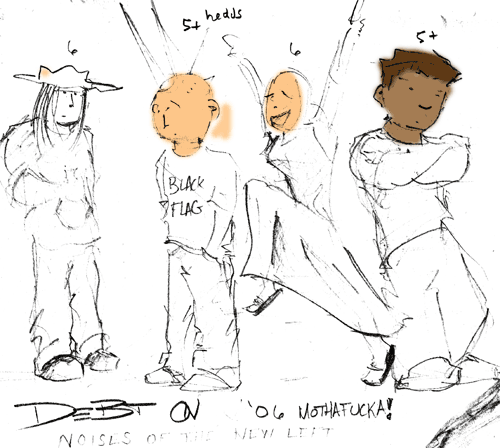
The next day I had planned on going to the Alternative Press Expo in San Francisco. This was my first big foray into self-promotion: the idea was that once you get a few hundred comic book people into a room together, they’re bound to start networking sooner or later. Maybe I could pick up a connection or two.
I went with my roommate Ben. While I got out my portfolio and a few hastily thrown together photocopies, he headed for the longboxes and the promise of back issues for twenty-five cents or less.
When I think back on the conversations I had that day, I laugh a little in embarrassment. Whether it’s true or not, I think I usually overstayed my welcome, I’m not sure if people were insulted that I didn’t so I can sell a little merchandise and quit my job. But the real point is I don’t want to work, I want to draw comics instead.
So weary from shoving my plastic covered pages in people’s faces and anxiously awaiting their approval, I slumped down against the far corner. After a while, Ben came over.
“Dude I just picked up the Denny O’Neil Question numbers 1-6 in that quarter bin.”
“Really?” I asked. “That’s good stuff.”
“Yeah, dude. They got a bunch more in there too. A couple Spectre issues too.”
I put my portfolio in my bag and shuffled over to the nearest longboxes. In the next two hours I put together complete runs of the Question and the Spectre, a few random Batman issues and scored a hardcover Batman collection and trade paperbacks of Green Arrow and Spiderman. I spent forty-five dollars. That shit was awesome.
When we left the sun had set and a slight drizzle had set in for the evening. In the morning and afternoon we were granted a reprieve from the bad weather and the sun shone brilliantly. Even in the ever-foggy San Francisco.
Ben headed back for the East Bay with his Bounty of comic books. I started walking fifteen blocks uptown: a friend from work had told me his photography exhibit was opening at a gallery there.
The gallery was a storefront between a bar and a pizza parlor. It was sparsely decorated in the front, but inside its freshly painted walls and hardwood floors reminded me of a museum. It’s claustrophobic walls reminded me that it was not.
In the center of the ground floor a spiral staircase led to the upstairs. Here a DJ was setting up, and a bar was in the corner. This is also where my friend Jack was greeting people in front of his photographs.
He greeted me with a handshake and a hug. After a minute he showed me his pictures. I remembered that he had told me he went to Mexico, and now it turned out the trip was for photography. His work was characterized by vibrant primary colors, sometimes in stripes of skirts or brooms, or just bottles of hot sauce. There were strong religious themes to his pictures as well, in fact the exhibit was shaped like a cross with a statue of the Virgin Mary as the top image. There were also subtle corporate logos throughout a few of the pictures, something I never got a chance to ask him about.
The exhibit next to his was a painter with a strong comics or manga influence. I was very excited about these, particularly a series of canvases of various sizes telling a rather abstract story. By this I was extremely impressed.
I went back to talk to Jack who was sitting next to an older woman. He stood up.
“Scott, this is my mother.” I shook her hand and kneeled on the floor in front of the two of them. “Scott’s a coworker at the restaurant, and also a fellow artist.”
“Oh, you are? What do you do?”
“Comics. I write and draw comic strips.”
“Oh! What are they like?” Jack was looking at me anxiously as well. He had never seen my comics. In fact, I had just found out he was a photographer the day before.
“Well it’s kind of a political thing. About kids my age trying to find jobs…”
“Oh! Political. So like the Boondocks. My, its hard to believe he’s taking a sabbatical already.” I found the fact that she liked the Boondocks encouraging. “So where can I see your work?”
“Well, since I was at the convention today,” I said with a smug smirk, “I just happen to have some stuff with me.”
I let them look through my portfolio, with a bit less of the “I really hope they like this” feeling that stubbornly kept invading my gut.
Jack turned to a page that had Sid and Bounty watching television from behind. It was drawn mostly in silhouette with the television offering the only source of illumination.
“Now this is good illustration I think.”
“I wish I had my glasses.”
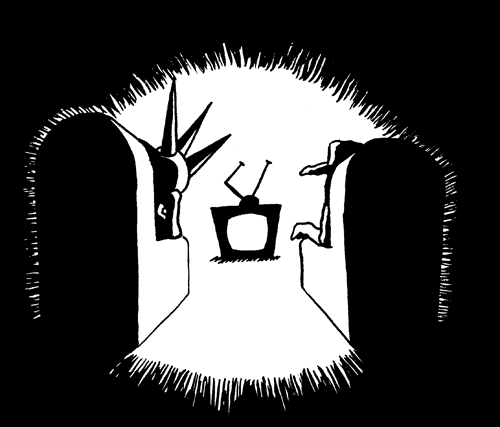
After a few more minutes of conversation Jack had to greet a few more people at the door. I stayed kneeling in front of his mother.
“Where are you from?” she asked.
“New York, originally.”
“Oh, really? But you don’t have an accent.”
“Funny, some say I do.”
“Oh so are you from Manhattan?”
“No, Poughkeepsie. A bit upstate.” People always seem to feel cheated when you tell them you’re from New York, but not New York City. Like you lied to them or something. New York is a much bigger place than most make it out to be.
“Oh I grew up in Queens,” she said. “But I moved to California when I was a little girl.”
“Oh. So did Jack grow up here? I thought he lived in Chicago.”
“No, Jack just went to school in Chicago. He grew up here with us,” she motioned toward on older man standing in the corner. I presumed this to be Jack’s father.
“So did you live here your whole life?”
“Well no,” she said, polite yet slightly annoyed, “I grew up in Queens.”
“Oh, yeah. You just told me that.” Suddenly feeling the fool I decided it was time to end the conversation.
“Well, it’s been lovely talking to you.”
I sat down at the bar next to Joe, another coworker. He had told me that he was a friend of Jack’s that had moved out to stay with him from Chicago so I wasn’t surprised to see him turn up at the gallery.
I had arrived early in the evening, and guests were just starting to trickle in. Joe and I chatted with the bartender a little.
She worked at the gallery, and helped organize the event, but knew nothing about running a bar. Most of the time she was running around the gallery. Joe noticed some commotion between her and an older man with wild hair and a purple shirt about the price lists for the exhibits. Apparently, someone forgot to make photocopies. He turned to me and said, “I know she’s about to ask us to get copies of that.”
She came back over and put the document in front of us. She offered to buy us a beer and the deed was done.
The bartender’s directions to the copy store were vague. Go up a block and turn right is all I made out. Another guy at the bar said we should pass Sacramento and California before we got there.
On the way we chatted about Jack’s artwork, the gallery, San Francisco, and the weather. Joe had moved to the Bay for very abstract reasons, mostly just to see the area and live there for a while.
Filling a slight pause in the conversation he asked, “have you ever been in love?”
“Yeah, once I think.”
“Well where is she?”
“It didn’t work out. We put some distance between us and it was more than the relationship could bear.”
“Was she a keeper?”
“A keeper? I guess… I don’t know. To be honest I’m really glad things didn’t work out. I don’t think life would have been very much fun.”
He laughed. “I got this girl back in Chicago. Man, I dunno, it’s tough being apart like this. But I’m not sure I should go home just because of a woman.”
“I hear that. If I’d done it, I would have regretted it.”
“Yeah, we fight a lot, but I really think she understands me. And that’s not an easy thing to find.”
“No, it’s not.” The conversation paused. “What do you do, man?” I asked. “I mean, are you an artist like Jack?”
“No, noo… Well, I was a film student.”
“Well what happened with that?”
“I don’t know. I was drinking a lot back then. You know, I’d get so drunk or high and I would think differently. Bad thoughts, about fighting and women.”
“But you stopped?”
“Yeah well…” he stopped a second. “When I tell people this they think it means I’m trying to preach to them when really I’m just trying to answer your question.”
“Go ahead. No worries.”
“OK, well I started reading the Bible, and it made a lot of sense to me.”
“Huh.”
We both stopped. Before us was an enormous hill like you would only find in San Francisco.
“How many more blocks you say we’ve got?” he asked.
“Um.. about four more.”
“Hm. Probably take us about to the top of this hill.” Joe took a deep breath.
“Glad I quit smoking,” I said. We started trekking up the hill.
“Do you read the Bible?” he asked me.
“Me? Well, not seriously, but I’ll browse it now and then. It’s an important book. But let me ask you this: there’s a lot of different ideas about what the Bible means or says these days, and some of them I don’t understand. There seem to be such intolerant ideas floating around.”
“I hear ya, bro. I don’t think that a Christian should do anything to harm another. I mean, being a Christian, it’s like love for… for everything! It’s like ultimate compassion, ultimate love.”
Those are good philosophical ideals,” I said. “It’s unfortunate that some people want to corrupt that message with war and intolerance.”
“I hear ya, bro. It’s like they’re not even reading the same book! Oh, shit.” He looked away.
“I shouldn’t have said that. I don’t like to judge people. Do you think you judge people?”
“Well I… yeah, I do judge people! At least people who cause war and suffering without a second thought. Those are the people I think do wrong in our world. The ones with power. In fact, I’d rather hold on to a philosophy of love and compassion, but one that didn’t exist under a higher power. I don’t think we need leaders as much as everyone thinks we do.”
“Word. That’s cool, you’re still my brother.”
“Right on, man.”
We reached the top of the hill and turned around. San Francisco as spread out before us like a giant amusement park, twinkling lights and fits of laughter and music drifting up into the stars. A few stars even did shine through the receding clouds. The moon hung over Oakland, about at our eye level, with the Bay Bridge dissecting in in between. To our right was the copy store.
We got the copies and headed back to the gallery. I stayed for a few more PBRs and saw a few people from work and met a few of Jack’s friends and family. Good times.
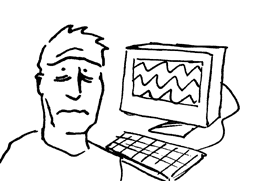
I sent my Apple back in for repairs the next day. A week later, they sent me an email telling me that repairs were completed, but not specifying the repairs. I was dubious.
On my way down to the Apple store I had to go over a small bridge. I glanced over the side and had to stop for a second. The bridge was over a small stream that wound through a bed of rocks and scattered plants. It reminded me of the banks of the rivers that surrounded the mountainous region of western Massachusetts where I attended school.
We used to sit by the banks of those rivers for hours, enjoying the sunshine, wading a bit, and breezily politicking on subjects ranging from gardening to philosophy to simple reminiscing. I found myself mesmerized and filled with a sudden desire to sit down by the stream and sketch the flow of the water and let the frustration ooze out of me rather than force it down the throat of some young technician at Apple in over his head. I sighed and trekked forward with a heavy head.
I took another glance at the stream, the sun glinting off the water and winding down underneath the bridge. The water was probably polluted and the spot hardly serene. But it was like a window back to those lazy afternoons along the river soaking up the sun. I looked up: I stood in the shadow of the parking garage. I stepped forward and felt its rays hot on my black shirt. The rain was over.
Maybe, I thought, the introduction of computers and promotion and networking, maybe it pollutes my art. Already it takes time away from the actual creative process. I have to be working for my comic in order to make my comic. Throw in the technological factor of equipment breaking, and I’ve lost another chunk of time. When is there actually time to draw??? I keep finding it, but at the expense of other responsibilities.
I should be back at that stream sitting by it day after day, sketching the flow of the water as it winds lazily by stacked rocks and falling twigs. I’d look up in the autumn and see the red and yellow hues of the changing leaves, and perfect the stark winter landscape in charcoal and graphite.
But then where would my story be?
Enough of this emo shit. New comics start on Monday. And if you think you recognize yourself in this story, you’re wrong. And if you’re right, just remember: at least you’re not that dentist. And if you are that dentist: dude, you CRAZY.



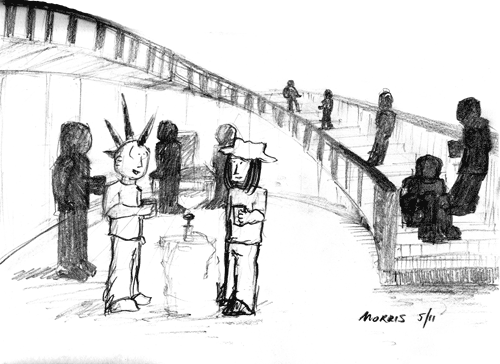
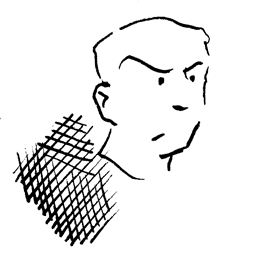
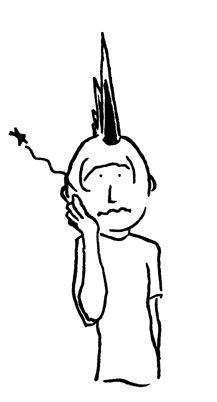 A few days after that I had a dentist appointment for my toothache. I didn’t have any insurance, so I had to go to a local clinic that offered credit programs for those who couldn’t afford dental insurance. It had been years since I’d seen a dentist, and my diagnosis reflected that. I listened in horror as the doctor rattled off a list of problems with my mouth that began with the most dreaded thing a dentist can say to you:
A few days after that I had a dentist appointment for my toothache. I didn’t have any insurance, so I had to go to a local clinic that offered credit programs for those who couldn’t afford dental insurance. It had been years since I’d seen a dentist, and my diagnosis reflected that. I listened in horror as the doctor rattled off a list of problems with my mouth that began with the most dreaded thing a dentist can say to you: